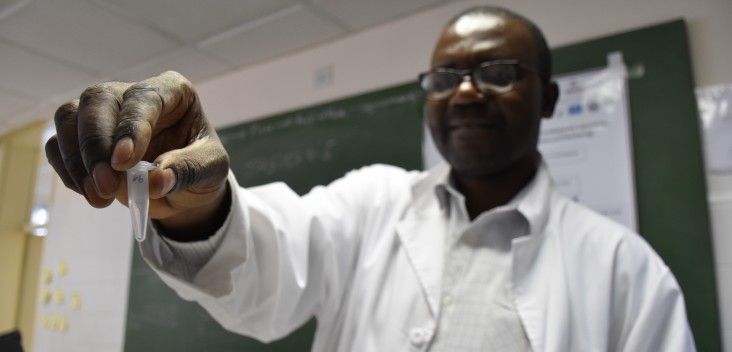- What We Do
- Agriculture and Food Security
- Democracy, Human Rights and Governance
- Economic Growth and Trade
- Education
- Environment and Global Climate Change
- Gender Equality and Women's Empowerment
- Global Health
- Humanitarian Assistance
- Transformation at USAID
- Water and Sanitation
- Working in Crises and Conflict
- U.S. Global Development Lab
Speeches Shim

Research and Development
USAID engagement with and funding for malaria research and development is longstanding and has yielded solid results. This includes supporting pioneering studies that demonstrated the effectiveness of insecticide-treated mosquito nets, enabling this lifesaving tool to become a core malaria intervention. USAID support for drug efficacy monitoring provided key evidence on the emergence of artemisinin resistance on the Thai-Cambodia border in the late 2000s. Several new artemisinin-based combination treatments for severe malaria were subsequently developed with USAID support, and the Agency has facilitated widespread introduction of these much-needed treatments. Development of malaria vaccines, novel insecticide-based vector control tools, and new antimalarial drugs are USAID's current research and development priorities.
Key activities in these areas include:
- Malaria Vaccine Development Program
- Innovative Vector Control Consortium
- Medicines for Malaria Venture
Innovation
Innovation is critical to achieving goals in the fight against malaria and addressing global health challenges. USAID streamlines processes, participates in market shaping initiatives, and works collaboratively with other partners to foster meaningful innovation.
As a leading buyer of malaria products, USAID actively engages with the global malaria marketplace to ensure access to quality malaria prevention, diagnosis, and treatment products at affordable prices. Through strategic sourcing and market analysis, USAID contributed to substantial reductions in the price of critical malaria products such as mosquito nets and rapid diagnostic tests.
USAID also identifies market-shaping opportunities to maximize market forces and accelerate access to lifesaving innovations. For example, USAID and PMI are engaged with UNITAID, the Innovative Vector Control Consortium, and other partners to stimulate development of and facilitate access to new insecticides for malaria control. This includes support for a co-payment program to lower the cost of novel insecticides and efforts to strengthen demand forecasting and healthy competition to keep prices affordable over the long term. Furthermore, USAID and PMI collaborate with the Bill & Melinda Gates Foundation around innovation, including in the Greater Mekong Subregion where drug resistance threatens impressive progress in malaria control and on operational research.

Comment
Make a general inquiry or suggest an improvement.